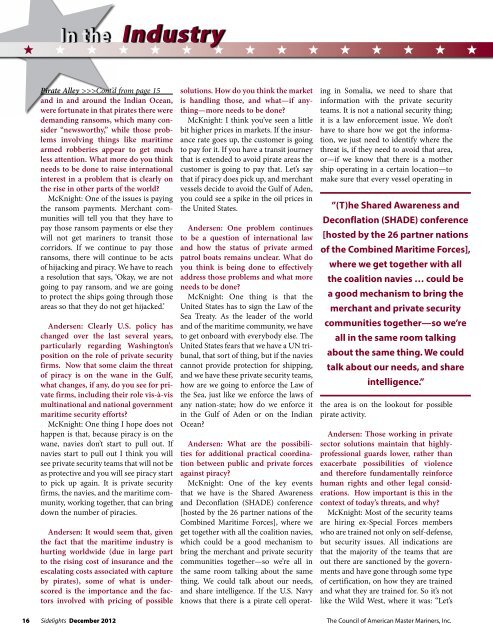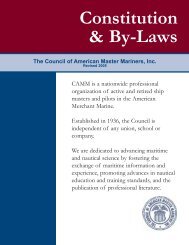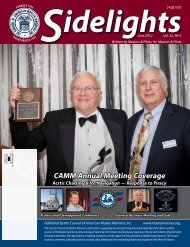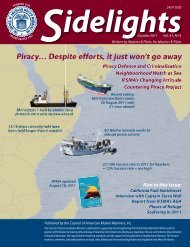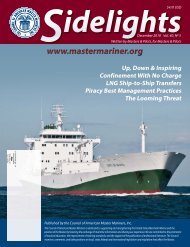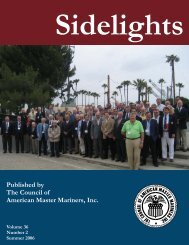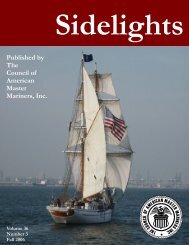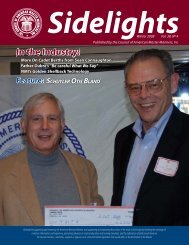Membership In the - Council of American Master Mariners
Membership In the - Council of American Master Mariners
Membership In the - Council of American Master Mariners
Create successful ePaper yourself
Turn your PDF publications into a flip-book with our unique Google optimized e-Paper software.
<strong>In</strong> <strong>the</strong><br />
<strong>In</strong>dustry<br />
Pirate Alley >>>Cont’d from page 15<br />
and in and around <strong>the</strong> <strong>In</strong>dian Ocean,<br />
were fortunate in that pirates <strong>the</strong>re were<br />
demanding ransoms, which many consider<br />
“newsworthy,” while those problems<br />
involving things like maritime<br />
armed robberies appear to get much<br />
less attention. What more do you think<br />
needs to be done to raise international<br />
interest in a problem that is clearly on<br />
<strong>the</strong> rise in o<strong>the</strong>r parts <strong>of</strong> <strong>the</strong> world?<br />
McKnight: One <strong>of</strong> <strong>the</strong> issues is paying<br />
<strong>the</strong> ransom payments. Merchant communities<br />
will tell you that <strong>the</strong>y have to<br />
pay those ransom payments or else <strong>the</strong>y<br />
will not get mariners to transit those<br />
corridors. If we continue to pay those<br />
ransoms, <strong>the</strong>re will continue to be acts<br />
<strong>of</strong> hijacking and piracy. We have to reach<br />
a resolution that says, ‘Okay, we are not<br />
going to pay ransom, and we are going<br />
to protect <strong>the</strong> ships going through those<br />
areas so that <strong>the</strong>y do not get hijacked.’<br />
Andersen: Clearly U.S. policy has<br />
changed over <strong>the</strong> last several years,<br />
particularly regarding Washington’s<br />
position on <strong>the</strong> role <strong>of</strong> private security<br />
firms. Now that some claim <strong>the</strong> threat<br />
<strong>of</strong> piracy is on <strong>the</strong> wane in <strong>the</strong> Gulf,<br />
what changes, if any, do you see for private<br />
firms, including <strong>the</strong>ir role vis-à-vis<br />
multinational and national government<br />
maritime security efforts?<br />
McKnight: One thing I hope does not<br />
happen is that, because piracy is on <strong>the</strong><br />
wane, navies don’t start to pull out. If<br />
navies start to pull out I think you will<br />
see private security teams that will not be<br />
as protective and you will see piracy start<br />
to pick up again. It is private security<br />
firms, <strong>the</strong> navies, and <strong>the</strong> maritime community,<br />
working toge<strong>the</strong>r, that can bring<br />
down <strong>the</strong> number <strong>of</strong> piracies.<br />
Andersen: It would seem that, given<br />
<strong>the</strong> fact that <strong>the</strong> maritime industry is<br />
hurting worldwide (due in large part<br />
to <strong>the</strong> rising cost <strong>of</strong> insurance and <strong>the</strong><br />
escalating costs associated with capture<br />
by pirates), some <strong>of</strong> what is underscored<br />
is <strong>the</strong> importance and <strong>the</strong> factors<br />
involved with pricing <strong>of</strong> possible<br />
solutions. How do you think <strong>the</strong> market<br />
is handling those, and what—if anything—more<br />
needs to be done?<br />
McKnight: I think you’ve seen a little<br />
bit higher prices in markets. If <strong>the</strong> insurance<br />
rate goes up, <strong>the</strong> customer is going<br />
to pay for it. If you have a transit journey<br />
that is extended to avoid pirate areas <strong>the</strong><br />
customer is going to pay that. Let’s say<br />
that if piracy does pick up, and merchant<br />
vessels decide to avoid <strong>the</strong> Gulf <strong>of</strong> Aden,<br />
you could see a spike in <strong>the</strong> oil prices in<br />
<strong>the</strong> United States.<br />
Andersen: One problem continues<br />
to be a question <strong>of</strong> international law<br />
and how <strong>the</strong> status <strong>of</strong> private armed<br />
patrol boats remains unclear. What do<br />
you think is being done to effectively<br />
address those problems and what more<br />
needs to be done?<br />
McKnight: One thing is that <strong>the</strong><br />
United States has to sign <strong>the</strong> Law <strong>of</strong> <strong>the</strong><br />
Sea Treaty. As <strong>the</strong> leader <strong>of</strong> <strong>the</strong> world<br />
and <strong>of</strong> <strong>the</strong> maritime community, we have<br />
to get onboard with everybody else. The<br />
United States fears that we have a UN tribunal,<br />
that sort <strong>of</strong> thing, but if <strong>the</strong> navies<br />
cannot provide protection for shipping,<br />
and we have <strong>the</strong>se private security teams,<br />
how are we going to enforce <strong>the</strong> Law <strong>of</strong><br />
<strong>the</strong> Sea, just like we enforce <strong>the</strong> laws <strong>of</strong><br />
any nation-state; how do we enforce it<br />
in <strong>the</strong> Gulf <strong>of</strong> Aden or on <strong>the</strong> <strong>In</strong>dian<br />
Ocean?<br />
Andersen: What are <strong>the</strong> possibilities<br />
for additional practical coordination<br />
between public and private forces<br />
against piracy?<br />
McKnight: One <strong>of</strong> <strong>the</strong> key events<br />
that we have is <strong>the</strong> Shared Awareness<br />
and Deconflation (SHADE) conference<br />
[hosted by <strong>the</strong> 26 partner nations <strong>of</strong> <strong>the</strong><br />
Combined Maritime Forces], where we<br />
get toge<strong>the</strong>r with all <strong>the</strong> coalition navies,<br />
which could be a good mechanism to<br />
bring <strong>the</strong> merchant and private security<br />
communities toge<strong>the</strong>r—so we’re all in<br />
<strong>the</strong> same room talking about <strong>the</strong> same<br />
thing. We could talk about our needs,<br />
and share intelligence. If <strong>the</strong> U.S. Navy<br />
knows that <strong>the</strong>re is a pirate cell operat-<br />
ing in Somalia, we need to share that<br />
information with <strong>the</strong> private security<br />
teams. It is not a national security thing;<br />
it is a law enforcement issue. We don’t<br />
have to share how we got <strong>the</strong> information,<br />
we just need to identify where <strong>the</strong><br />
threat is, if <strong>the</strong>y need to avoid that area,<br />
or—if we know that <strong>the</strong>re is a mo<strong>the</strong>r<br />
ship operating in a certain location—to<br />
make sure that every vessel operating in<br />
”(T)he Shared Awareness and<br />
Deconflation (SHADE) conference<br />
[hosted by <strong>the</strong> 26 partner nations<br />
<strong>of</strong> <strong>the</strong> Combined Maritime Forces],<br />
where we get toge<strong>the</strong>r with all<br />
<strong>the</strong> coalition navies … could be<br />
a good mechanism to bring <strong>the</strong><br />
merchant and private security<br />
communities toge<strong>the</strong>r—so we’re<br />
all in <strong>the</strong> same room talking<br />
about <strong>the</strong> same thing. We could<br />
talk about our needs, and share<br />
intelligence.”<br />
<strong>the</strong> area is on <strong>the</strong> lookout for possible<br />
pirate activity.<br />
Andersen: Those working in private<br />
sector solutions maintain that highlypr<strong>of</strong>essional<br />
guards lower, ra<strong>the</strong>r than<br />
exacerbate possibilities <strong>of</strong> violence<br />
and <strong>the</strong>refore fundamentally reinforce<br />
human rights and o<strong>the</strong>r legal considerations.<br />
How important is this in <strong>the</strong><br />
context <strong>of</strong> today’s threats, and why?<br />
McKnight: Most <strong>of</strong> <strong>the</strong> security teams<br />
are hiring ex-Special Forces members<br />
who are trained not only on self-defense,<br />
but security issues. All indications are<br />
that <strong>the</strong> majority <strong>of</strong> <strong>the</strong> teams that are<br />
out <strong>the</strong>re are sanctioned by <strong>the</strong> governments<br />
and have gone through some type<br />
<strong>of</strong> certification, on how <strong>the</strong>y are trained<br />
and what <strong>the</strong>y are trained for. So it’s not<br />
like <strong>the</strong> Wild West, where it was: “Let’s<br />
16 Sidelights December 2012 The <strong>Council</strong> <strong>of</strong> <strong>American</strong> <strong>Master</strong> <strong>Mariners</strong>, <strong>In</strong>c.


